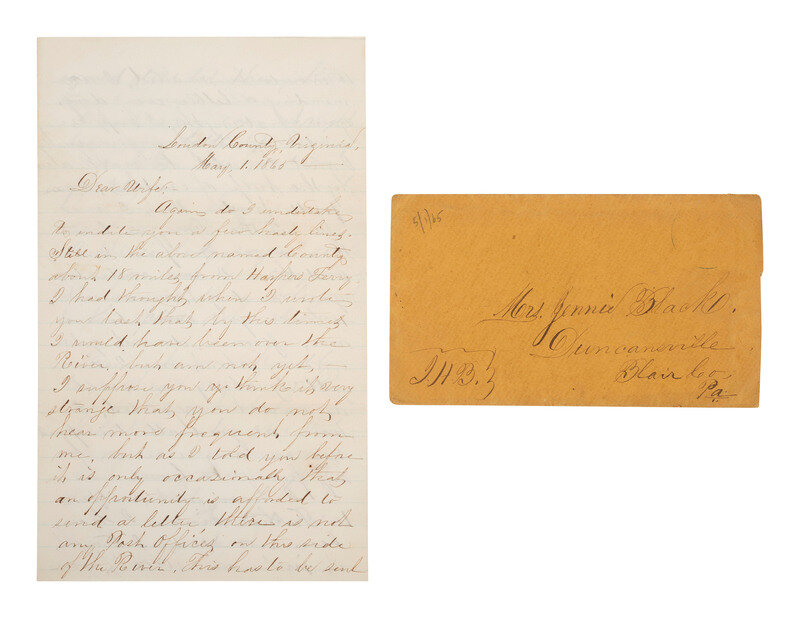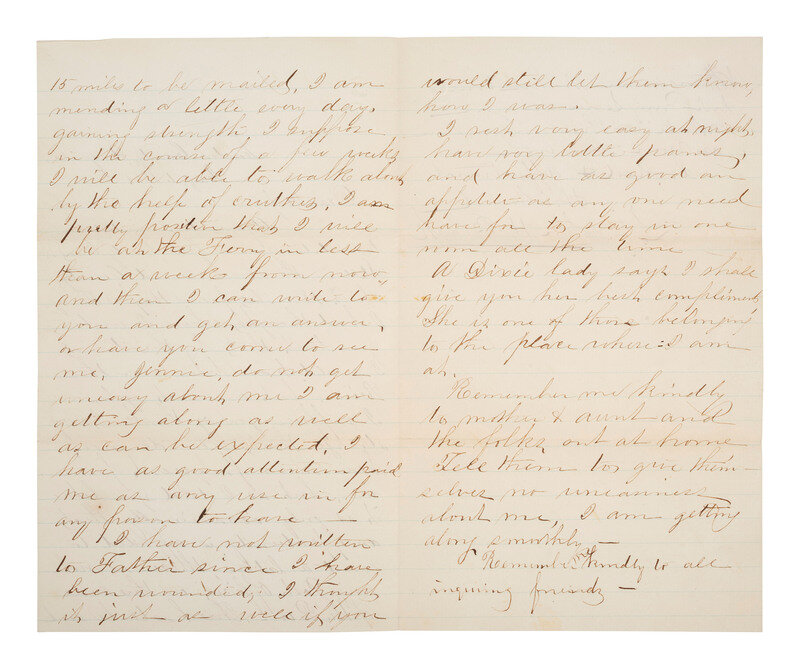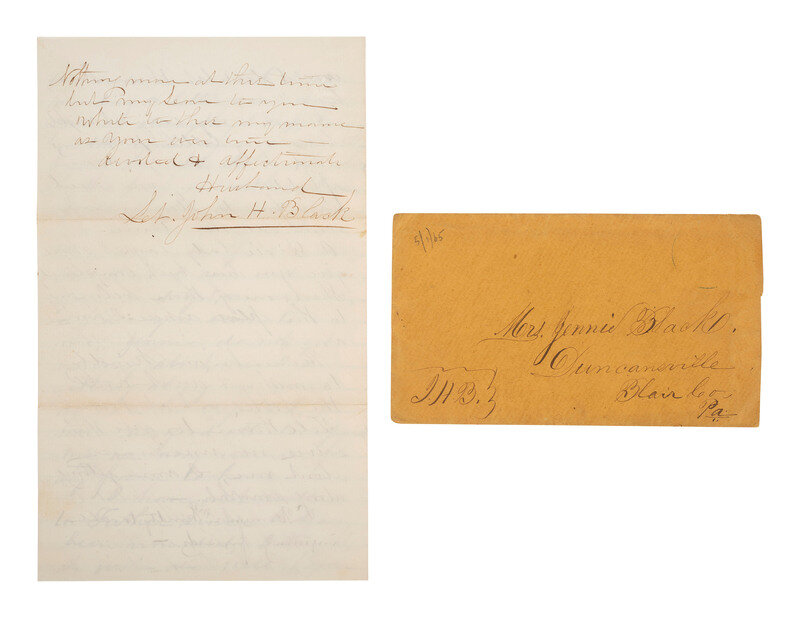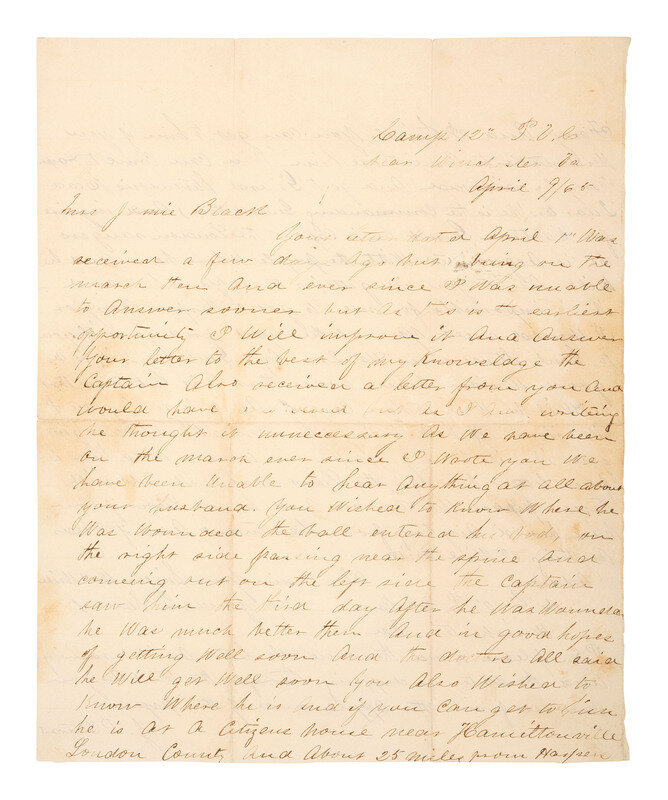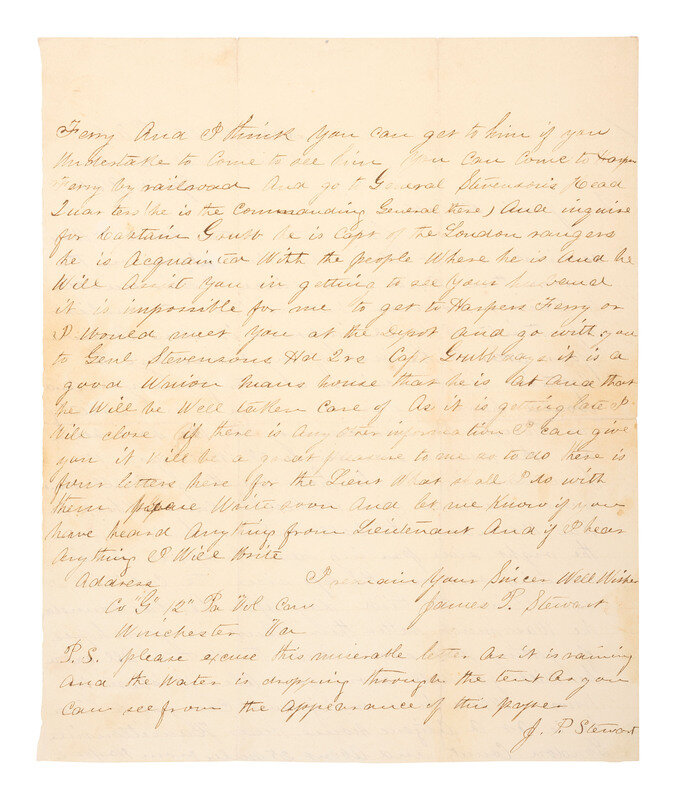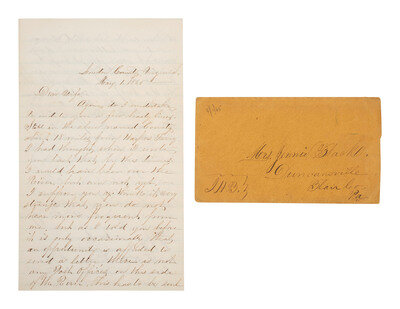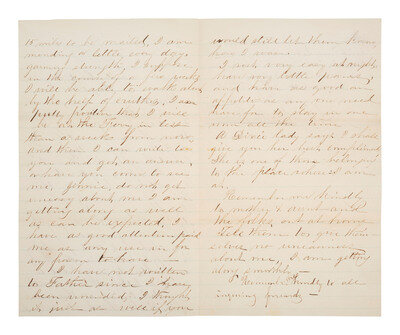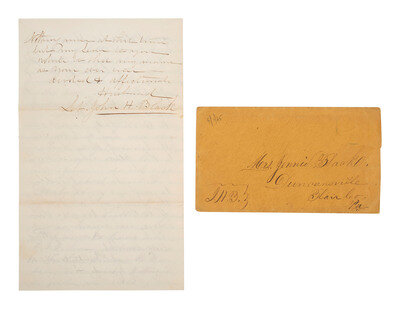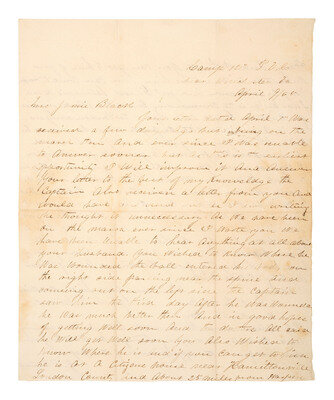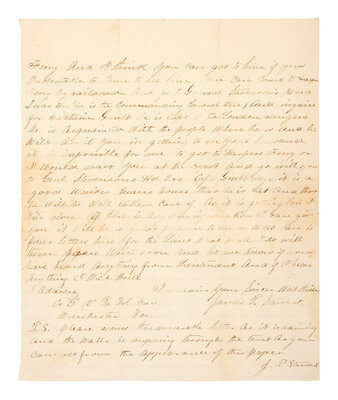Lot 450
[CIVIL WAR]. 2 letters written to the wife of Captain John H. Black, 12th Pennsylvania Cavalry.
Sale 1345 - American Historical Ephemera and Photography Online
Lots Open
Jun 19, 2024
Lots Close
Jul 2, 2024
Timed Online / Cincinnati
Own a similar item?
Estimate
$400 -
600
Price Realized
$254
Sold prices are inclusive of Buyer’s Premium
Lot Description
[CIVIL WAR]. 2 letters written to the wife of Captain John H. Black, 12th Pennsylvania Cavalry.
Black was wounded, robbed, and left for dead by "Mosby's Men." Autograph letter signed ("James P. Stewart") to Mrs. Jennie Black. "Near Winchester Va," 9 April 1865. 2 pages, 7 3/4 x 9 1/2 in. (folds, some separations repaired with clear tape, soiling, toning, wear to edges and corners).
Stewart undertakes to answer all of Mrs. Black's questions from a previous letter regarding the status and whereabouts of her husband. In part:
"As we have been on the march ever since I wrote you we have been unable to hear anything at all about your husband. You wished to know where he was wounded the ball entered his body on the right side passing near the spine and comeing [sic] out on the left side the captain saw him the third day after he was wounded he was much better then...You also wished to know where he is and if you can get to him he is at a citizen house near Hamiltonville Loudon County and about 25 miles from Harpers Ferry...you can come to Harpers Ferry by railroad and go to General Stevenson's Head Quarters (he is the commanding General there) and inquire for Captain Grubb he is Capt of the Loudon rangers...Capt Grubb says it is a good Union man's house that he is at and that he will be well taken care of."
Autograph letter signed ("Lt. John H. Black") to his wife. Loudon County, Virginia, 1 May 1865. 3 1/3 pages, 4 7/8 x 8 in., on bifolium (folds, minor soiling and toning). With stampless cover addressed to "Mrs. Jennie Black" of "Duncansville, Blair Co., Pa."
Black opens the letter lamenting that he is still in Loudon County and not "over the River" yet. He writes of his health, in part: "I am mending a little every day, gaining strength. I suppose in the course of a few weeks I will be able to walk alon[e?] by the help of crutches...I have as good attention paid me as any use in for any person to have...I rest very easy at night, have very little pains, and have as good an appetite as any one need have for to stay in one room all the time."
He then notes that a "Dixie lady" sends her best compliments, explaining, "She is one of those belonging to the place where I am at."
Together, 2 letters to Mrs. Jennie Black, wife of Lieutenant John H. Black.
John H. Black was a 27-year-old teacher when he enlisted as a corporal on 24 April 1861. That same day he mustered into Company H of the 14th Pennsylvania Infantry, a 3 months' regiment that did not engage the enemy during its term of service. After mustering out in August of that year, Black, along with many others of his regiment, re-enlisted. He mustered into Company G of the 12th Pennsylvania Cavalry on 24 January of 1862. The 12th lost heavily at Manassas Junction in August, and Second Winchester in June of 1863. Black chose to take a 30-day leave to marry his beloved Jennie in exchange for re-enlisting as a "Veteran Volunteer" in 1864, a choice he would soon regret.
In March of 1865, Black's regiment went on reconnaissance at the edge of the Blue Ridge Mountains. Mosby's rangers were laying in wait in the village of Harmony, VA, hoping a Union company would fall for their tried and true ploy of leaving some ranger in the middle of the road, only to ambush from a hidden location once the Union troops approached. Black's company took the bait, and got caught in a frenzied battle with the rangers in which Black was shot and knocked off of his horse. Paralyzed from the waist down, Black was robbed of all of his cash and personal effects, keeping only his pantaloons, shirt, and drawers. He was left for dead.
It is this wound that Stewart describes in the letter featured here, and from this ordeal that Black is recovering in the letter featured here. Black was eventually discharged, and, though disabled, lived a long life after the war, dying in 1922.
Stewart undertakes to answer all of Mrs. Black's questions from a previous letter regarding the status and whereabouts of her husband. In part:
"As we have been on the march ever since I wrote you we have been unable to hear anything at all about your husband. You wished to know where he was wounded the ball entered his body on the right side passing near the spine and comeing [sic] out on the left side the captain saw him the third day after he was wounded he was much better then...You also wished to know where he is and if you can get to him he is at a citizen house near Hamiltonville Loudon County and about 25 miles from Harpers Ferry...you can come to Harpers Ferry by railroad and go to General Stevenson's Head Quarters (he is the commanding General there) and inquire for Captain Grubb he is Capt of the Loudon rangers...Capt Grubb says it is a good Union man's house that he is at and that he will be well taken care of."
Autograph letter signed ("Lt. John H. Black") to his wife. Loudon County, Virginia, 1 May 1865. 3 1/3 pages, 4 7/8 x 8 in., on bifolium (folds, minor soiling and toning). With stampless cover addressed to "Mrs. Jennie Black" of "Duncansville, Blair Co., Pa."
Black opens the letter lamenting that he is still in Loudon County and not "over the River" yet. He writes of his health, in part: "I am mending a little every day, gaining strength. I suppose in the course of a few weeks I will be able to walk alon[e?] by the help of crutches...I have as good attention paid me as any use in for any person to have...I rest very easy at night, have very little pains, and have as good an appetite as any one need have for to stay in one room all the time."
He then notes that a "Dixie lady" sends her best compliments, explaining, "She is one of those belonging to the place where I am at."
Together, 2 letters to Mrs. Jennie Black, wife of Lieutenant John H. Black.
John H. Black was a 27-year-old teacher when he enlisted as a corporal on 24 April 1861. That same day he mustered into Company H of the 14th Pennsylvania Infantry, a 3 months' regiment that did not engage the enemy during its term of service. After mustering out in August of that year, Black, along with many others of his regiment, re-enlisted. He mustered into Company G of the 12th Pennsylvania Cavalry on 24 January of 1862. The 12th lost heavily at Manassas Junction in August, and Second Winchester in June of 1863. Black chose to take a 30-day leave to marry his beloved Jennie in exchange for re-enlisting as a "Veteran Volunteer" in 1864, a choice he would soon regret.
In March of 1865, Black's regiment went on reconnaissance at the edge of the Blue Ridge Mountains. Mosby's rangers were laying in wait in the village of Harmony, VA, hoping a Union company would fall for their tried and true ploy of leaving some ranger in the middle of the road, only to ambush from a hidden location once the Union troops approached. Black's company took the bait, and got caught in a frenzied battle with the rangers in which Black was shot and knocked off of his horse. Paralyzed from the waist down, Black was robbed of all of his cash and personal effects, keeping only his pantaloons, shirt, and drawers. He was left for dead.
It is this wound that Stewart describes in the letter featured here, and from this ordeal that Black is recovering in the letter featured here. Black was eventually discharged, and, though disabled, lived a long life after the war, dying in 1922.
This lot is located in Cincinnati.
Condition Report
Contact Information
Auction Specialist
